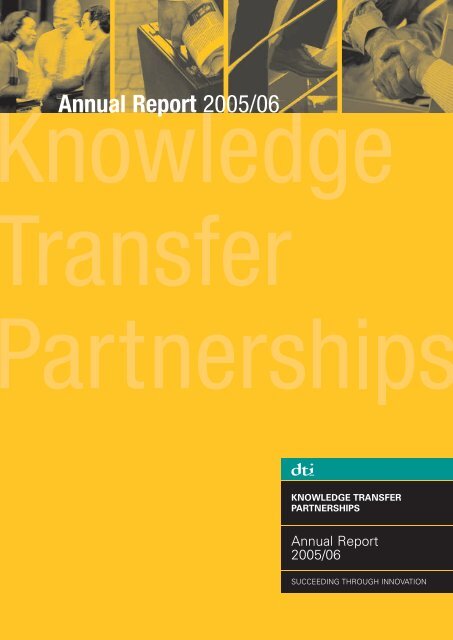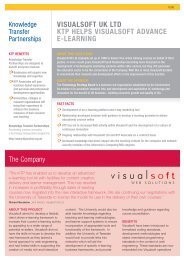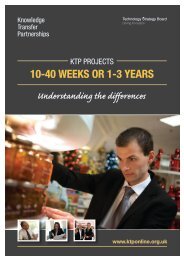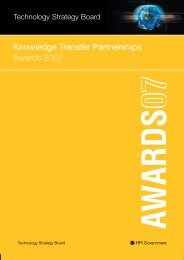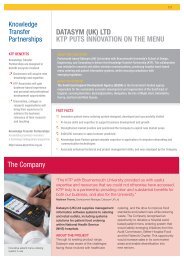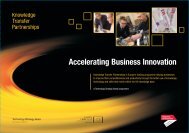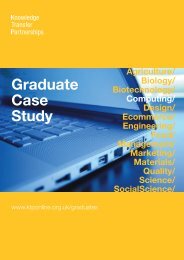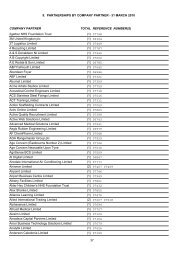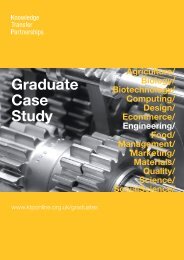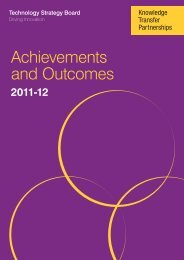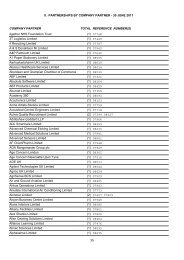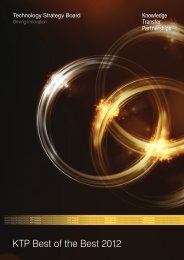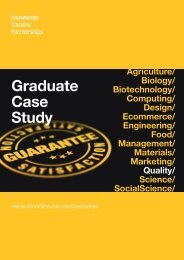Annual Report - Knowledge Transfer Partnerships
Annual Report - Knowledge Transfer Partnerships
Annual Report - Knowledge Transfer Partnerships
Create successful ePaper yourself
Turn your PDF publications into a flip-book with our unique Google optimized e-Paper software.
<strong>Annual</strong> <strong>Report</strong> 2005/06<br />
KNOWLEDGE TRANSFER<br />
PARTNERSHIPS<br />
<strong>Annual</strong> <strong>Report</strong><br />
2005/06<br />
SUCCEEDING THROUGH INNOVATION
<strong>Knowledge</strong> <strong>Transfer</strong> <strong>Partnerships</strong> is funded by:<br />
Arts and Humanities Research Council<br />
(www.ahrc.ac.uk)<br />
Biotechnology and Biological Sciences Research Council<br />
(www.bbsrc.ac.uk)<br />
Department for Environment, Food and Rural Affairs<br />
(www.defra.gov.uk)<br />
Department of Health<br />
(www.dh.gov.uk)<br />
Department of Trade and Industry<br />
(www.dti.gov.uk)<br />
Economic & Social Research Council<br />
(www.esrc.ac.uk)<br />
Engineering and Physical Sciences Research Council<br />
(www.epsrc.ac.uk)<br />
European Social Fund<br />
(www.esf.gov.uk)<br />
Invest Northern Ireland<br />
(www.investni.com)<br />
Natural Environment Research Council<br />
(www.nerc.ac.uk)<br />
The Northern Way<br />
(www.thenorthernway.co.uk)<br />
One NorthEast<br />
(www.onenortheast.co.uk)<br />
Particle Physics and Astronomy Research Council<br />
(www.pparc.ac.uk)<br />
Scottish Executive<br />
(www.scotland.gov.uk)<br />
Seeda<br />
(www.seeda.co.uk)<br />
Welsh Assembly Government<br />
(www.wales.gov.uk)
Contents<br />
Celebrating 30 years of KTP<br />
Foreword ........................................................................................................................................ 2<br />
Introduction to <strong>Knowledge</strong> <strong>Transfer</strong> <strong>Partnerships</strong> ......................................................... 4<br />
Highlights of the year ................................................................................................................ 6<br />
Focus on enhanced efficiency through strengthened regional teams ................... 8<br />
The National Forum ................................................................................................................. 10<br />
The 2005 <strong>Knowledge</strong> <strong>Transfer</strong> <strong>Partnerships</strong> Awards .................................................. 11<br />
Winner of the award for best <strong>Knowledge</strong> <strong>Transfer</strong> Partnership ............................. 12<br />
Winner of the award for Engineering Excellence ......................................................... 14<br />
Number of <strong>Partnerships</strong> ......................................................................................................... 16<br />
Financial commitment by Sponsor .................................................................................... 17<br />
Improving Outcomes ............................................................................................................... 18<br />
Participating <strong>Knowledge</strong> Base Institutions ...................................................................... 23<br />
Participating Associates ......................................................................................................... 27<br />
Strategic planning ..................................................................................................................... 31<br />
Looking forward ........................................................................................................................ 32<br />
Case studies ................................................................................................................................ 33<br />
Appendix ...................................................................................................................................... 35<br />
Further Information .................................................................................................................. 36<br />
<strong>Knowledge</strong> <strong>Transfer</strong> <strong>Partnerships</strong> <strong>Annual</strong> <strong>Report</strong> 2005/06 1
<strong>Annual</strong> <strong>Report</strong><br />
Foreword<br />
Lord David Sainsbury of<br />
Turville, Parliamentary<br />
Under Secretary of State<br />
for Science and Innovation<br />
2 <strong>Knowledge</strong> <strong>Transfer</strong> <strong>Partnerships</strong> <strong>Annual</strong> <strong>Report</strong> 2005/06<br />
<strong>Knowledge</strong> <strong>Transfer</strong> <strong>Partnerships</strong> (KTP) and its<br />
predecessor the Teaching Company Scheme<br />
(TCS) is based on a simple idea, win, win, win.<br />
Win for the business through knowledge<br />
acquisition to enable it to compete with new<br />
products, processes and markets. Win for the<br />
academic whose research is applied in business<br />
and new research ideas stimulated. Win for the<br />
recently qualified individual, the KTP Associate,<br />
whose project enables the company to make<br />
effective use of the knowledge it was seeking<br />
whilst they develop their own<br />
management/technical capabilities in a<br />
supported environment. There is a fourth win;<br />
that is the benefit these wins bring to the UK as<br />
a whole. We celebrated the 30th anniversary of<br />
the programme in both its forms because it<br />
delivers successful outcomes.<br />
This annual report highlights the broad range of<br />
activity that has occurred during 2005/06; KTP is<br />
now delivering over one thousand live <strong>Partnerships</strong><br />
at any one time, 15 government organisations now<br />
contribute to it. KTP has broadened its remit from<br />
the physical and social sciences to the creative<br />
“ AHRC is delighted to have been able to increase the range of expertise now<br />
available to UK organisations through its sponsorship of KTPs.<br />
Arts and humanities subjects can offer innovative solutions and have a particularly<br />
strong relationship supporting sectors such as the creative and cultural industries.<br />
We've been very pleased with the enthusiastic response from the sector, with a wide<br />
range of companies and researchers developing imaginative projects using expertise<br />
in fields such as art and design, music, drama, English literature, history, media<br />
studies and modern languages. KTPs are also enabling researchers and universities<br />
leverage the value of their research in real life applications and to recognise the<br />
benefits that taking part in KTPs offers to the research base.<br />
”<br />
Kezia Parry, <strong>Knowledge</strong> <strong>Transfer</strong> Programme Manager, AHRC.
arts, leisure and tourism - ensuring that our<br />
portfolio of partnerships matches the social,<br />
technological and economic priorities of the UK.<br />
Most significantly, our metrics are showing<br />
upward trends in almost every aspect. For<br />
every £1 million of Government spend the<br />
number of jobs created has increased from 77<br />
(2004/05) to 112 in 2005/06, for business the<br />
annual increase in profit before tax from<br />
£3.3 million to £4.24 million, the investment in<br />
plant and machinery needed by company<br />
partners from £1.54 million to £3.25 million.<br />
Significantly, this year 82% of KTPs have plans<br />
for further collaboration against 66% in the<br />
previous year.<br />
This year we have piloted some new and<br />
exciting ways of using KTP to work with<br />
overseas organisations, such as Westlink and<br />
the Ontario Centres of Excellence based in<br />
Canada. And we have initiated a collaboration<br />
with the Kauffman Fellowship Program in<br />
Kansas City, whereby two “KTP Associates” will<br />
be working in two of our leading Venture Capital<br />
firms for two years, helping them understand<br />
Celebrating 30 years of KTP<br />
some emerging business areas in order to help<br />
the developing businesses in these areas. I look<br />
forward to learning the outcomes from this pilot.<br />
The success story of KTP is due to the broad<br />
community it serves and I pay tribute to those<br />
individuals who participate. The academics who<br />
reach out to business offering their knowledge<br />
and expertise; the participating firms whose<br />
senior management understands the strategic<br />
importance of innovation; and the KTP<br />
Associates who are the linchpin to a partnership<br />
success, often changing the culture within their<br />
host business. Many become business leaders<br />
in their own right.<br />
Time after time KTP demonstrates this win, win,<br />
win through what is believed to be a unique<br />
knowledge transfer initiative.<br />
“ The Northern Way decided to invest in a pan-Northern KTP programme because<br />
of its potential to contribute to the closing of the wealth and health gap with the rest<br />
of the UK. To drive up value added and productivity, businesses must innovate.<br />
Smaller firms in particular may not know how, or may lack the staff to take a project<br />
forward. KTPs offer a proven means of overcoming both of these barriers, and also<br />
contribute to increase graduate employment in SMEs. Our particular sponsorship<br />
concerns public health, so a number of the recipients are public sector as well.<br />
Furthermore, in order to ensure benefits to the whole of the North of England, we<br />
require that results are disemminated across all of the North’.<br />
”<br />
David Sanderson, Innovation Lead, Northern Way.<br />
<strong>Knowledge</strong> <strong>Transfer</strong> <strong>Partnerships</strong> <strong>Annual</strong> <strong>Report</strong> 2005/06 3
Introduction to <strong>Knowledge</strong> <strong>Transfer</strong> <strong>Partnerships</strong><br />
About <strong>Knowledge</strong> <strong>Transfer</strong><br />
<strong>Partnerships</strong><br />
<strong>Knowledge</strong> <strong>Transfer</strong> <strong>Partnerships</strong> is Europe’s<br />
leading programme helping businesses to improve<br />
their competitiveness and productivity through the<br />
better use of knowledge, technology and skills that<br />
reside within the UK knowledge base.<br />
Each Partnership employs one or more high<br />
calibre Associates (recently qualified people),<br />
transferring the knowledge the company is<br />
seeking into the business. Each Associate<br />
works in the company on a project, which is<br />
core to the strategic development of the<br />
business.<br />
Through contact with businesses, the<br />
knowledge base partner (academic institution) is<br />
also provided with relevant and improved<br />
understanding of the challenges companies<br />
encounter, which in turn stimulates business<br />
relevant teaching materials and new research<br />
themes.<br />
<strong>Knowledge</strong> <strong>Transfer</strong> <strong>Partnerships</strong> is a UK-wide<br />
programme funded by 15 Government<br />
organisations led by the Department of Trade<br />
and Industry (DTI). Each Partnership is partfunded<br />
by the Government with the balance of<br />
the costs coming from the company partner.<br />
4 <strong>Knowledge</strong> <strong>Transfer</strong> <strong>Partnerships</strong> <strong>Annual</strong> <strong>Report</strong> 2005/06<br />
The flexibility of <strong>Knowledge</strong><br />
<strong>Transfer</strong> <strong>Partnerships</strong><br />
<strong>Knowledge</strong> <strong>Transfer</strong> <strong>Partnerships</strong> is intentionally<br />
flexible in delivery, allowing:<br />
• projects to vary in length between 12 and 36<br />
months<br />
• knowledge base partners to include Further<br />
Education Institutions (teaching at least the<br />
equivalent of NVQ Level 4) as well as Higher<br />
Education Institutions, Research and<br />
Technology Organisations and Public Sector<br />
Research Institutes<br />
• Associates to be either post-graduate<br />
researchers, university graduates, or<br />
individuals recently qualified to at least NVQ<br />
(Level 4) or equivalent.<br />
Benefits for the Associate<br />
<strong>Knowledge</strong> <strong>Transfer</strong> <strong>Partnerships</strong> can help<br />
Associates enhance their career prospects by<br />
providing them with the opportunity to manage a<br />
challenging project central to a company’s strategic<br />
development and long-term growth, as well as<br />
offering top class training and development in<br />
business management and leadership skills.<br />
• Over 75% of Associates are offered<br />
employment by their host company on<br />
completion of their project and overall 60%<br />
accept.<br />
“ A glance through this <strong>Annual</strong> <strong>Report</strong> will reveal that KTP brings<br />
enormous benefits to its participants, whether firms, Associates or academics.<br />
Our aim is to continue that work in partnership with an increasing number of<br />
sponsors and a broadening of the topics that we cover.<br />
”<br />
Dr Ian Harrison, <strong>Knowledge</strong> <strong>Transfer</strong> Services Directorate (now retired).
Benefits for the knowledge base<br />
Through <strong>Knowledge</strong> <strong>Transfer</strong> <strong>Partnerships</strong>,<br />
academics are able to:<br />
• develop business-relevant teaching materials<br />
• identify new research themes and undergraduate<br />
and post-graduate projects<br />
• publish high quality research papers<br />
• contribute to the Research Assessment<br />
Exercise (RAE) and rating of their<br />
department.<br />
Benefits for the company partner<br />
Business performance outputs vary considerably<br />
from case to case, given the rich variety of<br />
projects.<br />
Celebrating 30 years of KTP<br />
Latest information shows that, on average, the<br />
business benefits that can be expected from a<br />
single KTP project are:<br />
• an increase of over £290,000 in annual profits<br />
before tax<br />
• creation of eight genuine new jobs<br />
• an increase in the skills of existing staff.<br />
Put another way, for every £1 million of<br />
Government investment in <strong>Knowledge</strong> <strong>Transfer</strong><br />
<strong>Partnerships</strong>, the benefits achieved by UK<br />
businesses amount to:<br />
• £4.2 million increase in annual profits before tax<br />
• the creation of 112 genuine new jobs<br />
• 214 company staff trained.<br />
<strong>Knowledge</strong> <strong>Transfer</strong> <strong>Partnerships</strong>’ mission<br />
To strengthen the competitiveness, wealth<br />
creation and economic performance of the<br />
UK by the enhancement of knowledge and<br />
skills and the stimulation of innovation<br />
through collaborative projects between<br />
business and the knowledge base.<br />
The objectives of <strong>Knowledge</strong> <strong>Transfer</strong><br />
<strong>Partnerships</strong> are to:<br />
• facilitate the transfer of knowledge and the<br />
spread of technical and business skills,<br />
through innovation projects undertaken by<br />
high calibre, recently qualified people under<br />
the joint supervision of personnel from<br />
business and the knowledge base<br />
• provide company-based training for<br />
recently qualified people in order to<br />
enhance their business and specialist skills<br />
• stimulate and enhance business-relevant<br />
training and research undertaken by the<br />
knowledge base<br />
• increase the extent of interactions of<br />
businesses with the knowledge base and<br />
their awareness about the contribution that<br />
the knowledge base can make to business<br />
development and growth.<br />
In a recent DTI review, <strong>Knowledge</strong> <strong>Transfer</strong><br />
<strong>Partnerships</strong> emerged as one of the most<br />
successful knowledge transfer mechanisms<br />
that the Government offers to UK businesses.<br />
Each Partnership brings business benefits,<br />
skills and knowledge to industry, graduates<br />
and academics across the UK.<br />
<strong>Knowledge</strong> <strong>Transfer</strong> <strong>Partnerships</strong> <strong>Annual</strong> <strong>Report</strong> 2005/06 5
Highlights of the year<br />
30 years of success<br />
This year, KTP celebrated its 30-year<br />
anniversary at an awards event held at<br />
the Savoy Hotel in London. The event<br />
was attended by Sir Sam Edwards who,<br />
along with Sir Ieuan Maddock, set up the<br />
Teaching Company Scheme back in 1975.<br />
Financial year 2005/6 was one of substantial<br />
progress and change in the KTP<br />
Programme. Key developments included:<br />
• Fundamental revision and streamlining of<br />
the Partnership proposal, application and<br />
approval processes;<br />
• Thorough review and revision of the<br />
Partnership assessment and grading<br />
process;<br />
• Launch of the first KTP Guidebook and<br />
associated Newsletter as a way of<br />
communicating policy changes,<br />
guidelines and information to key<br />
stakeholders;<br />
• Implementation of full economic costing<br />
for <strong>Partnerships</strong> involving Higher<br />
Education Institutions;<br />
• Launch to stakeholders of an electronic<br />
marketing toolkit, portfolio of case<br />
studies and regular electronic newsletter<br />
(E-<strong>Transfer</strong>), all conforming to a new KTP<br />
identity;<br />
• Recruitment to further enhance the<br />
regional delivery teams;<br />
• Redesign and re-engineering of the IT<br />
systems at the heart of the KTP<br />
Programme.<br />
6 <strong>Knowledge</strong> <strong>Transfer</strong> <strong>Partnerships</strong> <strong>Annual</strong> <strong>Report</strong> 2005/06<br />
Three new Sponsors joined the programme:<br />
The Arts and Humanities Research Council<br />
(AHRC), South East England Development<br />
Agency (SEEDA) and The Northern Way.<br />
Over £36.5 million of grant support was<br />
committed to new <strong>Partnerships</strong> in 2005/06, an<br />
increase of 14% over the previous year,<br />
augmented by over £54.7 million from<br />
participating companies, an increase of around<br />
4% from 2004/05. This increase resulted<br />
largely from the use of European Social Fund<br />
matched funding which allowed an additional<br />
140 <strong>Partnerships</strong> to be approved.<br />
The total number of <strong>Partnerships</strong> in the portfolio<br />
increased by 17% from 858 to 1,002 during the<br />
course of the year, and the total number of<br />
projects from 958 to 1,114.<br />
Dr Ian Harrison, Sir Sam Edwards, Dr Debbie<br />
Buckley-Golder.<br />
Over the past 30 years, the <strong>Knowledge</strong> <strong>Transfer</strong><br />
<strong>Partnerships</strong> Scheme, and its predecessor, the<br />
Teaching Company Scheme, have given British<br />
firms new opportunities. Many people have<br />
helped to make the scheme such a success over<br />
the past 30 years, including Dr Ian Harrison, Sir<br />
Sam Edwards and KTP Programme Director<br />
Dr Debbie Buckley-Golder.
Fig 1 Total number of <strong>Partnerships</strong> in the<br />
Portfolio (2002 - 2006).<br />
Number of <strong>Partnerships</strong><br />
1,200<br />
1,000<br />
800<br />
600<br />
400<br />
200<br />
0<br />
909 903<br />
852<br />
858<br />
1,002<br />
2001/02 2002/03 2003/04<br />
Year<br />
2004/05 2005/06<br />
Participation by Further Education Institutions<br />
increased by 80% during 2005/06 to 29<br />
<strong>Partnerships</strong>, representing a tripling in the<br />
number of <strong>Partnerships</strong> during the course of the<br />
last three years. In addition, at the year-end<br />
there were 13 <strong>Partnerships</strong> with healthcare<br />
Celebrating 30 years of KTP<br />
organisations and six with educational<br />
organisations, each supported by ESRC funding.<br />
Much was done to support each Associate’s<br />
development as a Manager. During the year 99<br />
Associates attained the NVQ (Level 4) in<br />
Management. Their value was recognised with<br />
60% of Associates remaining in the<br />
employment of the company partner on project<br />
completion. In addition, 61% of completed<br />
<strong>Partnerships</strong> were independently graded<br />
‘excellent’ or ‘very good’, a statistic that has<br />
progressively increased over the past five years.<br />
Table 1 shows the grading given by Assessors<br />
to <strong>Partnerships</strong> completed since 2001/02. Over<br />
the five-year period an average of 55% of<br />
<strong>Partnerships</strong> were graded one or two (that is,<br />
were regarded by the Assessors as either<br />
‘excellent’ or ‘very good’). In 2005/06, for those<br />
graded, this increased to 61% although a higher<br />
proportion than previously were graded two.<br />
Year 2001/02 2002/03 2003/04 2004/05 2005/06<br />
No of Completed <strong>Partnerships</strong> 261 294 390 374 284*<br />
Graded 1 (High) 7 8 7 6 6<br />
2 45 44 46 50 55<br />
3 25 25 25 27 20<br />
4 9 8 12 9 9<br />
5 10 8 8 6 5<br />
6 (Low) 4 7 2 2 5<br />
Total (%) 100 100 100 100 100<br />
Table 1 Percentages of <strong>Knowledge</strong> <strong>Transfer</strong> <strong>Partnerships</strong> completed since March 2001 by grading.<br />
* These percentages are based on 122 of the 284 <strong>Partnerships</strong> completed in 2005/06, which had been graded at the year-end<br />
For every £1 million of Government funding spent on KTP, average benefits to<br />
company participants amounted to £4.24 million increase in annual profit before<br />
tax and £3.25 million investment in plant and machinery, with 112 new jobs<br />
created and 214 company staff trained.<br />
<strong>Knowledge</strong> <strong>Transfer</strong> <strong>Partnerships</strong> <strong>Annual</strong> <strong>Report</strong> 2005/06 7
Focus on enhanced efficiency through<br />
strengthened regional teams<br />
2005/06 was the first full year during which<br />
Momenta, an operating division of AEA<br />
Technology plc, was the managing agent for<br />
the KTP programme. The delivery team,<br />
based in Harwell, Oxfordshire, works with a<br />
comprehensive regional team made up of<br />
Regional Development Managers (RDM’s)<br />
and Advisers.<br />
The key focus for the delivery team has been to<br />
further improve efficiency and to strengthen<br />
regional support. Recruitment to the team of<br />
Advisers allowed for restructuring in order to<br />
respond to regional priorities and the objectives<br />
of new, regional sponsors. Sadly, one of the<br />
Adviser positions became available as a result of<br />
the sudden death of the Senior Adviser for the<br />
South West, Barry Twite, who was a valued<br />
colleague and contributor to the team.<br />
The team of Regional Development Managers<br />
was also enhanced with the recruitment of an<br />
additional member located in the North of<br />
England, this bringing the team to five. A key<br />
focus for the Regional Development Managers<br />
has been to increase engagement with the<br />
Further Education community across the<br />
country.<br />
Bob Astley<br />
8 <strong>Knowledge</strong> <strong>Transfer</strong> <strong>Partnerships</strong> <strong>Annual</strong> <strong>Report</strong> 2005/06<br />
North<br />
North<br />
North<br />
West<br />
South West<br />
& Wales<br />
East<br />
South East<br />
& London<br />
Bob Astley has rejoined KTP as a Regional Adviser for North West England. Bob’s name may be<br />
familiar as he previously worked on the KTP programme. Bob’s experience is gained from working<br />
for a large manufacturing company and at the University of Birmingham.<br />
Idris Price<br />
Fig 2 Regions split by RDM.<br />
Idris Price has joined KTP as the Regional Adviser for North Wales. He has a background in<br />
electronics engineering and was previously Managing Director of an Electronics company. He has<br />
been involved in several EU-funded education and training projects, working with project partners<br />
from other European countries.
Regional Delivery Teams<br />
North Group<br />
Devolved Administration: Scottish Executive and<br />
Invest Northern Ireland<br />
RDM: Alan Hendry<br />
North West Group<br />
RDA: North West Development Agency and<br />
Advantage West Midlands<br />
RDM: Nick Ward<br />
East Group<br />
RDA: One North East, Yorkshire Forward and<br />
East Midland Development Agency<br />
RDM: Paul Rosen<br />
South West & Wales<br />
Devolved Administration and RDA: Welsh<br />
Assembly Government and South West of<br />
England Development Agency<br />
RDM: Dr Alexandra Humphris-Bach<br />
South East & London<br />
RDA: South East England Development Agency,<br />
East of England Development Agency and<br />
London Development Agency<br />
RDM: Wendy Mannix<br />
Nick Ward<br />
Nick’s experience includes 26 years with a High Street retail<br />
organisation, originally supporting mainframe computer systems, later<br />
running their head office facilities. Since then, Nick has engaged with<br />
promoting resource efficiency and waste minimisation for<br />
consultancies, and also managed a public / private business<br />
regeneration partnership for 3 years. In his spare time, Nick is<br />
studying for an MA in ‘Contemporary Urban Renaissance’.<br />
Celebrating 30 years of KTP<br />
Dr Gerry Black – Senior Adviser<br />
Mr Neil Duncan Mr Ken Frame<br />
Mr Tony Mitchell Mr William Morris<br />
Mrs Fiona Nightingale – Senior Adviser<br />
Dr David Britton Dr Russ Bromley<br />
Ms Jose Freedman Mr Phillip Ternouth<br />
Mr Bob Astley<br />
Mr Richard Parker-Smith – Senior Adviser<br />
Mr John Clayton Mr Andrew Darwent<br />
Ms Philippa Ryan Mr Mike Willis<br />
Mr James Best – Senior Adviser<br />
Dr Ted Jones Mr Howard Nicholls<br />
Dr Gillian Rysiecki Dr Dave Pippard<br />
Mr Idris Price (joined June 2006)<br />
Dr Paul Naylor – Senior Adviser<br />
Dr Martin Fakley Mr Doug Irish<br />
Mr Maurice Jones Dr Ray McKee<br />
Mrs Jan Stringer Mr Brian Cannan<br />
Mrs Jan Dobson Dr Terry Corner<br />
(joined June 2006) (joined August 2006)<br />
<strong>Knowledge</strong> <strong>Transfer</strong> <strong>Partnerships</strong> <strong>Annual</strong> <strong>Report</strong> 2005/06 9
The National Forum<br />
The KTP National Forum was formed by the<br />
KTP Manager community to give itself a<br />
national voice. The forum provides a<br />
mechanism for university based KTP Offices<br />
and centres to enhance communications with<br />
Momenta and the DTI, and to lobby and<br />
influence on behalf of its members.<br />
10 <strong>Knowledge</strong> <strong>Transfer</strong> <strong>Partnerships</strong> <strong>Annual</strong> <strong>Report</strong> 2005/06<br />
The meetings perform the useful function of<br />
enabling discussion and resolution of operational<br />
issues. The committee also allows the<br />
tremendous experience of the KTP Manager<br />
community to be focussed on strategic matters<br />
of longer term importance to KTP. It forms a<br />
national focus for KTP at the practitioner level,<br />
and helps raise the profile of KTP.<br />
Top row left to right - Melanie Powell, Robin Brown, Susan Thomson, Paul Thomas, Steven Hardy,<br />
Martin May. Bottom row left to right - Val Wooff, Linda Hyder, Bob Howlett, Emma Hewitt, Phil Fiddaman<br />
(other members not pictured are Kate Darby, Mary Flynn and Susan Semple).<br />
“ Since we put the National Forum structure in place two years ago, it has proved<br />
very effective. The National Forum Committee meetings enable stakeholders at the<br />
operational level of KTP to get round the table together. The presence of Momenta's<br />
Martin Webb at the meetings often helps us to resolve day-to-day issues before they<br />
get out of hand. Representation on the DTI KTP Management Board by myself or<br />
another National Forum Committee member allows us to contribute to top level DTI<br />
thinking on KTP. The National Forum has proved so useful that I wonder whether we<br />
should consider parallel structures for KTP supervisors and Associates.<br />
”<br />
Dr Bob Howlett, Chair, KTP National Forum Committee.
The 2005 <strong>Knowledge</strong> <strong>Transfer</strong> <strong>Partnerships</strong><br />
Awards event was held at the Savoy Hotel,<br />
London on 28th March 2006. The event<br />
celebrated and recognised the achievements<br />
of all participants in the nine winning<br />
<strong>Knowledge</strong> <strong>Transfer</strong> <strong>Partnerships</strong> that had<br />
been judged as the best of those completed<br />
in the preceding calendar year, and the six<br />
winners of the ‘Business Leaders of<br />
Tomorrow’ Award for current Associates.<br />
The event also celebrated 30 Years of<br />
<strong>Knowledge</strong> <strong>Transfer</strong> <strong>Partnerships</strong>.<br />
Business Leaders of Tomorrow<br />
for 2005<br />
Mark Chadwick, Alternative Group and<br />
Liverpool John Moores University<br />
Laura Bishop, Country Valley Foods and<br />
University of Teeside<br />
Emmeline Child, Kettering Textiles Ltd and<br />
University College Northampton<br />
Cameron Fraser, Caledonian Aerotech and<br />
Heriot-Watt University<br />
Katja Krebs, Zeina Foods and University of<br />
Huddersfield<br />
Ross Grazey, siGEN and<br />
Robert Gordon University<br />
Celebrating 30 years of KTP<br />
The 2005 <strong>Knowledge</strong> <strong>Transfer</strong> <strong>Partnerships</strong> Awards<br />
Winning <strong>Partnerships</strong> for 2005<br />
Best <strong>Knowledge</strong> <strong>Transfer</strong> Partnership<br />
for 2005<br />
The University of York and Authentix Limited<br />
Award for Engineering Excellence<br />
University of Exeter and C.H. Medical Ltd<br />
Best Application of Social Science or<br />
Management<br />
University of the West of England, Bristol<br />
and North Bristol NHS Trust<br />
Award-Winning <strong>Partnerships</strong><br />
• Coventry University and Elekta Ltd<br />
• Sheffield Hallam University and<br />
Inditherm PLC<br />
• Kingston University and Lerch, Bates &<br />
Associates Limited (The FM Company)<br />
• Napier University and Oregon Timber<br />
Frame Limited<br />
• University of Durham and Pressed Steel<br />
Products Ltd (PSP)<br />
• University of Reading and Solar Century<br />
Holdings Limited<br />
Business Leaders<br />
of Tomorrow<br />
Award winners<br />
(L to R),<br />
Mark Chadwick,<br />
Laura Bishop,<br />
Emmeline Child,<br />
Cameron Fraser,<br />
Katja Krebs,<br />
Ross Grazey.<br />
<strong>Knowledge</strong> <strong>Transfer</strong> <strong>Partnerships</strong> <strong>Annual</strong> <strong>Report</strong> 2005/06 11
Winner of the Award for Best<br />
<strong>Knowledge</strong> <strong>Transfer</strong> Partnership<br />
AUTHENTIX LIMITED, York with THE UNIVERSITY OF YORK,<br />
Department of Chemistry Sponsored by DTI<br />
Aim: To develop a prototype test<br />
system for detection of markers in<br />
fuels based on microfabrication<br />
technology, electroseparations and<br />
solid state optical detection.<br />
This KTP developed a novel method for<br />
detecting levels of security markers in fuels<br />
using a rapid, automated and reliable test that<br />
can be carried out in the field. Illicit trading of<br />
fuel is a global problem, costing governments<br />
and industry billions of pounds annually in lost<br />
tax revenues and sales.<br />
(L to R), Mr Ian Eastwood, Company Director, Professor David Goodall, Academic Supervisor, Dr Ian<br />
Harrison, <strong>Knowledge</strong> <strong>Transfer</strong> Services Directorate (now retired), Dr Mohammed Al Jafari, Associate<br />
and Mr Erwin Dorland, Industrial Supervisor.<br />
“ The KTP programme... demonstrates to our customers and<br />
investors that we invest in new technologies and solutions with a<br />
direct commercial driver.<br />
”<br />
12 <strong>Knowledge</strong> <strong>Transfer</strong> <strong>Partnerships</strong> <strong>Annual</strong> <strong>Report</strong> 2005/06
Whilst current technology allows fuel testing to<br />
be conducted in the laboratory, a rapid field test<br />
would reduce costs and increase market<br />
accessibility.<br />
Company benefits<br />
The KTP project and the IP generated (two<br />
patents filed and one in preparation)<br />
demonstrate to customers that the company<br />
invests in new technologies and solutions with a<br />
direct commercial driver. The success of the<br />
first project has led to the company investing in<br />
a follow-on KTP project with two Associates and<br />
aims to commit more funds in knowledge<br />
enhancement. The development of the novel<br />
reader for security inks has enabled the<br />
company to secure two contracts worth several<br />
million dollars.<br />
Academic benefits<br />
The concepts and techniques investigated have<br />
resulted in the initiation of exciting new research<br />
programmes. Good practice in project<br />
management gained through this partnership<br />
has benefited the analytical science research<br />
group. The work has helped promote the<br />
University of York as a dynamic centre for<br />
industrial collaboration and a place to conduct<br />
highly relevant research into problems from the<br />
real world. The Partnership has contributed to<br />
the development of staff at the university by<br />
allowing them to focus on new science and<br />
technology that is at the cutting edge of<br />
instrumentation development and commercially<br />
relevant.<br />
Celebrating 30 years of KTP<br />
KTP Associate Dr Mohammed Al-Jafari<br />
presenting at the this years KTP Awards.<br />
Associate benefits<br />
With the experience, skills, and confidence<br />
developed during the KTP project, Dr Al-Jafari<br />
has been able to progress his career at an<br />
exceptional rate since completion of the project<br />
and returning to his home country of Jordan in<br />
January 2005. He set up Duna Rayb Commercial<br />
Establishment in January, with the goal of<br />
bringing expertise in the field of product<br />
authentication into the region. In February, Dr Al-<br />
Jafari was invited back to the UK as a consultant<br />
to Authentix to help the company start the new<br />
KTP project following on from his own work.<br />
<strong>Knowledge</strong> <strong>Transfer</strong> <strong>Partnerships</strong> <strong>Annual</strong> <strong>Report</strong> 2005/06 13
Winner of the Award for Engineering Excellence<br />
C.H. MEDICAL LTD, Exeter with UNIVERSITY OF EXETER,<br />
Department of Engineering Sponsored by EPSRC<br />
Aim: To increase the company’s sales<br />
turnover, exports and profits by<br />
improving the design and<br />
performance of its unique Mennen<br />
orthopaedic bone plates.<br />
14 <strong>Knowledge</strong> <strong>Transfer</strong> <strong>Partnerships</strong> <strong>Annual</strong> <strong>Report</strong> 2005/06<br />
The partnership has achieved an improved<br />
orthopaedic bone plate, which is 150% stronger<br />
than its predecessor and a patent application<br />
has been submitted for the new, novel design.<br />
The company has established in-house<br />
bioengineering expertise with R&D capability,<br />
ensuring regulatory approval of the new implant,<br />
which is now CE marked. Two further new<br />
products are currently being developed.<br />
C.H. Medical Ltd, Exeter and the University of Exeter, Department of Engineering being presented with their<br />
Award. (L to R) Mr Christos Pappas, Associate, Dr Ian Harrison, <strong>Knowledge</strong> <strong>Transfer</strong> Services Directorate<br />
(now retired), Ms Shamala Govindasamy, University of Exeter, Mr Chris Harrod, Academic Supervisor.<br />
“ The company has established an R&D capability and two<br />
additional implant products are currently being developed, which<br />
will positively further increase sales and profit.<br />
”
Company benefits<br />
The KTP partnership has resulted in a<br />
significantly improved implant for bone fracture<br />
fixation with additional uses, accompanied with<br />
the technological data required for successful<br />
marketing worldwide. Sales of the new plate<br />
have increased the company’s market share<br />
from 5% to 11.6%. Sales turnover has<br />
increased by 111%, exports by 109% and profit<br />
by 476%. The new structured approach to R&D<br />
has enabled the company to enhance its quality<br />
management systems certification to the<br />
highest levels, ISO 9001:2000 and ISO<br />
13485:2003.<br />
Academic benefits<br />
The framework of the partnership and the<br />
results achieved have clearly focused the<br />
importance of industrial input at each stage of<br />
R&D. Eight undergraduate and postgraduate<br />
projects have already been spun-off, providing<br />
valuable industrial exposure to the students. The<br />
five papers already presented at international<br />
conferences and the two papers submitted for<br />
journal publication all help to raise the profile of<br />
the Engineering Department, nationally and<br />
internationally, in the field of medical devices<br />
research. The success of the project has<br />
attracted a further NPL grant aided project<br />
involving both partners.<br />
Celebrating 30 years of KTP<br />
KTP Associate Mr Christos Pappas demonstrating<br />
the improved orthopaedic bone plate at the KTP<br />
Awards exhibition.<br />
Associate benefits<br />
Christos Pappas has increased his knowledge<br />
and understanding of engineering principles and<br />
improved his technical skills and capabilities. Full<br />
involvement in all the relevant company<br />
functions (manufacturing, regulatory, financial,<br />
market research and marketing) provided<br />
invaluable experience and illustrated the<br />
importance and interdependence of each<br />
function in the process of developing a new<br />
product and bringing it to market. A PhD from<br />
the University of Exeter and an NVQ Level 4 in<br />
Management from the Chartered Institute of<br />
Management, together with the acquired skills,<br />
will lead to Chartered Engineer status.<br />
<strong>Knowledge</strong> <strong>Transfer</strong> <strong>Partnerships</strong> <strong>Annual</strong> <strong>Report</strong> 2005/06 15
Number of <strong>Partnerships</strong><br />
During the year, 587 new proposals for<br />
<strong>Knowledge</strong> <strong>Transfer</strong> <strong>Partnerships</strong> were<br />
submitted to the <strong>Partnerships</strong> Approvals<br />
Group and 498 (85%) were supported or<br />
conditionally supported. This compares with<br />
506 proposals considered and 457 (90%)<br />
supported or conditionally supported in<br />
2004/05. In all, during the year beginning<br />
16 <strong>Knowledge</strong> <strong>Transfer</strong> <strong>Partnerships</strong> <strong>Annual</strong> <strong>Report</strong> 2005/06<br />
April 2005, grant offer letters were despatched<br />
on behalf of the Sponsors to establish 487<br />
new <strong>Knowledge</strong> <strong>Transfer</strong> <strong>Partnerships</strong>, an<br />
increase of 15% on the previous year.<br />
A total of 284 <strong>Partnerships</strong> finished during the<br />
year, compared with 374, which ended in<br />
2003/04.<br />
Fig 3 Geographic distribution of companies participating in <strong>Knowledge</strong> <strong>Transfer</strong> <strong>Partnerships</strong> (2002 - 2006).<br />
March 2002<br />
UK total 909<br />
March 2003<br />
UK total 903<br />
March 2004<br />
UK total 852<br />
858<br />
<strong>Partnerships</strong><br />
in portfolio<br />
at 1 April<br />
2005<br />
+<br />
487<br />
Offer letters<br />
despatched<br />
53 (6%)<br />
113 (13%)<br />
76 (8%)<br />
667 (73%)<br />
45 (5%)<br />
125 (14%)<br />
70 (8%)<br />
663 (73%)<br />
52 (6%)<br />
107 (13%)<br />
63 (7%)<br />
630 (74%)<br />
59<br />
<strong>Partnerships</strong><br />
not<br />
established<br />
March 2005<br />
UK total 858<br />
March 2006<br />
UK total 1002<br />
Changes in <strong>Knowledge</strong> <strong>Transfer</strong> <strong>Partnerships</strong> portfolio 2005/06.<br />
Northern Ireland<br />
Scotland<br />
284<br />
– – =<br />
<strong>Partnerships</strong><br />
completed<br />
or ceased<br />
in year<br />
Wales<br />
England<br />
52 (6%)<br />
95 (11%)<br />
75 (9%)<br />
636 (74%)<br />
62 (6%)<br />
106 (11%)<br />
97 (10%)<br />
737 (73%)<br />
1002<br />
<strong>Partnerships</strong><br />
at 31 March<br />
2006
Financial commitment by Sponsor<br />
The total value of grants committed to new<br />
<strong>Partnerships</strong> was £36.5 million, which<br />
represents an increase of £4.5 million or 14%<br />
from 2004/05. In addition, over £54.7 million<br />
was committed by the participating<br />
companies in the form of cash funding for<br />
academic partners, Associate salaries and<br />
investments required to support the full<br />
implementation and exploitation of the<br />
<strong>Partnerships</strong>. This was over and above the<br />
commitment of Government grants and<br />
represents an increase of £2 million, or 4%,<br />
on the previous year. An outline of the<br />
financial commitments by Sponsors is<br />
provided in Table 2.<br />
Duration of projects<br />
Greater flexibility has been introduced into the<br />
Programme over recent years, to allow Projects<br />
of between 12 and 36 months' duration, with<br />
particular emphasis on growing numbers of 12month<br />
<strong>Partnerships</strong> involving Further Education<br />
Colleges as the <strong>Knowledge</strong> Base Partner.<br />
Table 3 shows the distribution according to the<br />
duration of Projects which were established<br />
during 2005/06.<br />
Celebrating 30 years of KTP<br />
Sponsor Actual Expenditure (£k)<br />
BBSRC 46<br />
DEFRA 713<br />
DH (inc NHSSW) 72<br />
DTI 19,266<br />
DTI/ESF* 1,916<br />
EPSRC 1,400<br />
EPSRC-CTA** 20<br />
ESRC 1,149<br />
Invest NI 843<br />
NERC 34<br />
One NorthEast 7<br />
PPARC 14<br />
SE 592<br />
WAG 779<br />
Total 26,851<br />
Table 2 Budgeted and actual expenditure levels<br />
for <strong>Knowledge</strong> <strong>Transfer</strong> <strong>Partnerships</strong> in 2005/06<br />
by Sponsor.<br />
* The figure for DTI/ESF expenditure is the total amount<br />
claimed by Projects. Approximately 45% [£862k] of this<br />
amount is recoverable from EU ESF funding.<br />
** EPSRC-CTA expenditure is that portion of KTP Project costs<br />
covered by this element and paid to HEIs as part of the<br />
EPSRC Collaborative Training Account award. The cofunding<br />
element is included within the appropriate Sponsor<br />
expenditure figures.<br />
Up to 23 months 24 months 25-36 months Total<br />
Number of<br />
Associate places<br />
56 (17) 362 (345) 114 (98) 532 (460)<br />
Proportion of portfolio (%) 11% (4%) 68% (75%) 21% (21%) 100% (100%)<br />
Table 3 Duration of projects on <strong>Knowledge</strong> <strong>Transfer</strong> <strong>Partnerships</strong> established 2005/06 (figures for<br />
2004/05 are shown in brackets).<br />
“ Elekta’s competitive position has improved significantly - we<br />
are able to target specific market segments not previously<br />
accessible.<br />
”<br />
Elekta Limited.<br />
<strong>Knowledge</strong> <strong>Transfer</strong> <strong>Partnerships</strong> <strong>Annual</strong> <strong>Report</strong> 2005/06 17
Improving outcomes<br />
Upon completion of each Partnership, the<br />
participants prepare a final report, which is<br />
reviewed by two members of an independent<br />
grading panel*. The reported outcomes that<br />
follow are taken from these final reports. The<br />
panel grades each Partnership on a scale of 1<br />
to 6, taking into account the success of the<br />
relationship between the participants as well<br />
as the tangible outcomes of the projects.<br />
Participating Companies<br />
Final <strong>Report</strong>s from <strong>Partnerships</strong> indicated that,<br />
as a result of participation in <strong>Knowledge</strong><br />
<strong>Transfer</strong> <strong>Partnerships</strong>, companies achieved<br />
increased profitability through the changes<br />
summarised in Fig 4. Within every category an<br />
increasing proportion of companies has reported<br />
improvements each year since 2003/04 (apart<br />
from Improved Quality where a similar<br />
proportion reported in the latter two years). A<br />
summary of benefits from participation is given<br />
in Table 4.<br />
In 84% of cases it was reported by the<br />
participants that the results achieved would be<br />
significant to the future performance of the<br />
company concerned; this compares with a<br />
similar figure (81%) in 2004/05. Almost all of the<br />
knowledge base partners reported that they had<br />
benefited highly from participating in the<br />
<strong>Partnerships</strong>; 91% benefiting through staff<br />
development (93% in the previous year), 86%<br />
reporting benefits to research (previously 88%)<br />
and 89% reporting benefits to teaching<br />
(previously 85%).<br />
*Details of the Independent Grading Panel can be found in the Appendix on page 35.<br />
18 <strong>Knowledge</strong> <strong>Transfer</strong> <strong>Partnerships</strong> <strong>Annual</strong> <strong>Report</strong> 2005/06<br />
Fig 4 Reasons given by companies for increased<br />
profitability from <strong>Partnerships</strong> in <strong>Knowledge</strong><br />
<strong>Transfer</strong> <strong>Partnerships</strong> graded between 2003 - 2006.<br />
51%<br />
43%<br />
55%<br />
47%<br />
58%<br />
47%<br />
2003/04<br />
2004/05<br />
2005/06<br />
54%<br />
61%<br />
57%<br />
62%<br />
60%<br />
66%<br />
New Markets<br />
Increased Sales<br />
Improved Quality Improved Operations<br />
Companies could identify more than one reason
The highest one-off increase in profit before tax<br />
was £4.0 million. The highest annual increase in<br />
profit before tax after Partnership completion<br />
was £24 million. The highest reported<br />
investment in plant and machinery was<br />
£13 million.<br />
The one-off increase in profit before tax, the<br />
annual increase in profit before tax after<br />
Partnership Completion and the investment in<br />
plant and machinery vary considerably across<br />
<strong>Partnerships</strong>, as indicated in Fig 5. However, the<br />
pattern observed is very similar to previous years.<br />
Celebrating 30 years of KTP<br />
2004/05 2005/06<br />
One-off Increase in Profit Before Tax £49,909 (highest £1.7m) £77,567 (highest £4.0m)<br />
<strong>Annual</strong> Increase in Profit Before Tax<br />
after Partnership’s Completion<br />
£227,350 (highest £20m) £291,135 (highest £24m)<br />
Investment in Plant and Machinery 105,862 (highest £7m) £223,465 (highest £13m)<br />
Number of New Research<br />
Projects Initiated<br />
3.2 4<br />
Number of Research Papers<br />
Published in Refereed Journals<br />
1 1<br />
Number of Other Articles Published 1 1<br />
Intellectual Property Agreement<br />
Between Partners<br />
67% 77%<br />
Expect Commercial Benefit from<br />
Application of Intellectual Property<br />
24% 24%<br />
Plans for Further Collaboration 66% 82%<br />
Table 4 Effects of participation in <strong>Knowledge</strong> <strong>Transfer</strong> <strong>Partnerships</strong> on companies and knowledge base<br />
organisations per Associate Project (Average benefits from Partnership Final <strong>Report</strong>s graded 2004/05<br />
and 2005/06).<br />
Fig 5 Variations in information provided in KTP<br />
Final <strong>Report</strong>s graded 2005/06.<br />
Number of <strong>Partnerships</strong><br />
250<br />
200<br />
150<br />
100<br />
50<br />
0<br />
Up to<br />
£50,000<br />
£51,000 -<br />
£150,000<br />
Range<br />
£151,000 -<br />
£500,000<br />
One-off increase in profit before tax<br />
<strong>Annual</strong> increase in profit before tax<br />
Investment in plant and machinery<br />
Over<br />
£500,000<br />
<strong>Knowledge</strong> <strong>Transfer</strong> <strong>Partnerships</strong> <strong>Annual</strong> <strong>Report</strong> 2005/06 19
Benefits for companies from each<br />
£1 million of Government<br />
expenditure<br />
During the year 403 new <strong>Partnerships</strong> were<br />
established with SMEs (compared with 365 the<br />
previous year) and 84 with large companies<br />
(compared with 60 in 2004/05). Information on<br />
the overall portfolio of <strong>Partnerships</strong> at the end of<br />
the year by company size is given in Table 5.<br />
Overall, the proportion of <strong>Partnerships</strong> fig 8with<br />
large<br />
companies increased by 3% to 16%, with<br />
corresponding 1% reductions for micro, small<br />
and medium-sized companies, although the<br />
number of <strong>Partnerships</strong> with companies in each<br />
of the size groups increased during the course<br />
of the year.<br />
Fig 6 Comparison of numbers of jobs created<br />
within companies over four years.<br />
Number of jobs created<br />
Number of company staff trained<br />
120<br />
100<br />
80<br />
60<br />
40<br />
20<br />
70<br />
62<br />
fig 9<br />
65<br />
fig 7<br />
77<br />
2001/02 2002/03 2003/04<br />
Year<br />
2004/05 2005/06<br />
2001/02 2002/03 2003/04 2004/05 2005/06<br />
Fig 7 Comparison of numbers Year of company staff<br />
trained over four years.<br />
350<br />
300<br />
345<br />
Micro- Small Medium-sized Large Total<br />
250<br />
259<br />
businesses<br />
(less 263 than<br />
Enterprises<br />
(10 - 49<br />
Enterprises<br />
(50 - 249<br />
Enterprises<br />
(250 or more<br />
200<br />
10 employees) employees)<br />
214<br />
employees) employees)<br />
Number of <strong>Partnerships</strong><br />
150<br />
Proportion of Portfolio<br />
161<br />
(%)<br />
131<br />
13%<br />
438<br />
44%<br />
274<br />
27%<br />
159<br />
16%<br />
1002<br />
100%<br />
Number 100 of Associate Places 133 473 314 194 1114<br />
Proportion 50 of Portfolio (%) 12% 43% 500 28% 17% 100%<br />
Table 05<br />
<strong>Knowledge</strong> <strong>Transfer</strong> 400<br />
2001/02 2002/03 2003/04 fig<br />
Partnership<br />
10<br />
Portfolio by Size of Enterprise (March 2006).<br />
2004/05 2005/06<br />
Year<br />
300<br />
112<br />
100<br />
20 <strong>Knowledge</strong> <strong>Transfer</strong> <strong>Partnerships</strong> <strong>Annual</strong> <strong>Report</strong> 2005/06<br />
0<br />
2001 2002 2003 2004 2005 2006<br />
Number of jobs created<br />
Number of company staff trained<br />
Benefits for companies<br />
(£ millions)<br />
Number of <strong>Partnerships</strong><br />
120<br />
100<br />
80<br />
60<br />
40<br />
20<br />
350<br />
300<br />
250<br />
200<br />
150<br />
100<br />
50<br />
0<br />
4.5<br />
4.0<br />
3.5<br />
3.0<br />
2.5<br />
2.0<br />
1.5<br />
1.0<br />
0.5<br />
0<br />
2001/02 2002/03 2003/04<br />
Year<br />
200<br />
70<br />
345<br />
62<br />
161<br />
65<br />
259<br />
77<br />
263<br />
2001/02 2002/03 2003/04 2004/05<br />
Year<br />
Fig 8 Profit and investment benefits to<br />
companies over four years.<br />
2004/05 2005/06<br />
One-off increase in profit before tax<br />
<strong>Annual</strong> increase in profit before tax<br />
Investment in plant and machinery<br />
112<br />
214<br />
2005/06
2001/02 2002/03 2003/04<br />
Year<br />
2004/05 2005/06<br />
One-off increase in profit before tax<br />
<strong>Annual</strong> increase in profit before tax<br />
Investment in plant and machinery<br />
Fig 9 <strong>Knowledge</strong> <strong>Transfer</strong> <strong>Partnerships</strong> portfolio<br />
by size of enterprise 2001 - 2005.<br />
Number of <strong>Partnerships</strong><br />
500<br />
400<br />
300<br />
200<br />
100<br />
0<br />
2001 2002 2003 2004<br />
Year<br />
2005<br />
2006<br />
Micro businesses (fewer than 10 employees)<br />
Small enterprises (10 - 49 employees)<br />
Medium-sized enterprises (50 - 249 employees)<br />
Large enterprises (250 or more employees)<br />
Celebrating 30 years of KTP<br />
Industrial Sector March 02 March 03 March 04 March 05 March 06<br />
No (%) No (%) No (%) No (%) No (%)<br />
Aerospace 8 (1) 9 (1) 7 (
“ The KTP Associate provided the company with a focus for<br />
research, development and innovation... we got clarity and<br />
projects started to happen. Getting involved with KTP ... had the<br />
effect of broadening our horizons and I have no doubt it will<br />
help us enter new markets.<br />
”<br />
Hugh Stewart, Chairman, Caledonian Alloys Ltd.<br />
22 <strong>Knowledge</strong> <strong>Transfer</strong> <strong>Partnerships</strong> <strong>Annual</strong> <strong>Report</strong> 2005/06
At the end of the year, 447 departments from<br />
104 Higher Education Institutions (HEIs) were<br />
involved in <strong>Knowledge</strong> <strong>Transfer</strong> <strong>Partnerships</strong>,<br />
an increase of 33 departments and four<br />
Institutions from the previous year. In<br />
addition, the number of Further Education<br />
Institutions (FEIs) participating more than<br />
doubled, to nine, with five knowledge base<br />
organisations which were neither HEIs nor<br />
FEIs also participating (compared with three<br />
the previous year). Thus, altogether there<br />
were 118 knowledge base organisations<br />
taking part, an increase of 10% from the<br />
previous year.<br />
Celebrating 30 years of KTP<br />
Participating <strong>Knowledge</strong> Base Institutions<br />
The subject range of the departments is<br />
illustrated in Table 7, which also shows figures<br />
for the previous four years and records the non-<br />
HEI and non-FEI organisations in the ‘other’<br />
category. The percentage of 5 and 5* HEI<br />
departments participating in new <strong>Partnerships</strong> in<br />
March 06 was 33%, an increase from 29% in<br />
the previous two years.<br />
Academic % of 909 % of 903 % of 852 % of 858 % of 1002<br />
Department <strong>Partnerships</strong> <strong>Partnerships</strong> <strong>Partnerships</strong> <strong>Partnerships</strong> <strong>Partnerships</strong><br />
(Mar 02) (Mar 03) (Mar 04) (Mar 05) (Mar 06)<br />
Agriculture & Food 6 5 5 2 2<br />
Biology 2 3 3 3 3<br />
Chemical Engineering 2 2 2 1 1<br />
Chemistry 2 2 3 3 3<br />
Civil Engineering 2 3 3 3 3<br />
Computing 19 19 16 14 16<br />
Design 4 4 3 5 6<br />
Electrical Engineering 6 5 4 4 4<br />
Engineering & Technology 12 13 16 21 21<br />
Management 16 19 24 24 21<br />
Material Technology 2 2 1 2 1<br />
Mathematics 1 1 1 1
<strong>Knowledge</strong> Base Partner Company Partner No of Length of<br />
Associates Project<br />
(Months)<br />
Belfast Institute of Further Bite Snack Foods Limited 1 18<br />
& Higher Education<br />
Belfast Institute of Further Image Zoo NI Limited 1 18<br />
& Higher Education<br />
Belfast Institute of Further MO Team Limited 1 18<br />
& Higher Education<br />
Coleg Menai, Bangor Cwmni Tref Caernarfon Cyf 1 18<br />
Coleg Morganwg T B Davies (Cardiff) Limited 1 24<br />
Doncaster College My<strong>Knowledge</strong>Map Limited 1 18<br />
Doncaster College Thorn Hinton Limited 1 18<br />
Gorseinon College Birchfield Interactive plc 1 18<br />
Gorseinon College BJ Group Limited 1 24<br />
Gorseinon College Business Systems Services (UK) Ltd 1 24<br />
Gorseinon College Business Systems Services (UK) Ltd 1 18<br />
1 24<br />
Gorseinon College Castell Howell Foods Limited 1 24<br />
Gorseinon College Clynderwen and Cardiganshire 1 36<br />
Farmers Limited<br />
Gorseinon College DataStart (Wales) Limited 1 18<br />
Gorseinon College Dezrez Services Limited 1 24<br />
Gorseinon College Dezrez Services Limited 1 24<br />
Gorseinon College Farsight Security Limited 1 24<br />
Gorseinon College Gower Business Systems Limited 1 18<br />
Gorseinon College M4 Broadcasting Limited 1 24<br />
Gorseinon College SmartData UK Limited 1 18<br />
Gorseinon College Sporttrain Wales Limited 1 24<br />
Gorseinon College Sporttrain Wales Limited 2 24<br />
Gorseinon College Welsh Hockey Union Limited 1 24<br />
Gorseinon College Wheelies Direct Limited 1 18<br />
Newcastle College Microtima Limited 1 18<br />
Newry Institute of Further Pro-Fit Trailers Limited 1 24<br />
and Higher Education<br />
North West Institute of Further Global Building Products Limited 1 18<br />
and Higher Education<br />
North West Institute of Further North & West Housing Limited 1 18<br />
and Higher Education<br />
The College Ystrad Mynach Mojo Suspension Hoodoo Limited 1 24<br />
Total 31<br />
Table 8 <strong>Knowledge</strong> <strong>Transfer</strong> <strong>Partnerships</strong> with Further Education Institutions (March 2006).<br />
24 <strong>Knowledge</strong> <strong>Transfer</strong> <strong>Partnerships</strong> <strong>Annual</strong> <strong>Report</strong> 2005/06
Celebrating 30 years of KTP<br />
<strong>Knowledge</strong> Base Partner Company Partner No of Length of<br />
Associates Project<br />
(Months)<br />
Building Research Establishment Unicorn Products Limited 1 24<br />
Institute of Grassland & Penhow Nurseries Limited 1 36<br />
Environmental Research<br />
Roslin Institute Farm Animal Genetics & Genomics 1 24<br />
Faraday Partnership Limited<br />
Roslin Institute Landcatch Natural Selection Limited 1 36<br />
Smith Institute Indeva Energy Consultants Limited 1 24<br />
TWI Limited Goodfellow Cambridge Limited 1 24<br />
TWI Limited Metalysis Limited 1 27<br />
Total 7<br />
Table 9 <strong>Knowledge</strong> <strong>Transfer</strong> <strong>Partnerships</strong> with other research organisations, March 2006.<br />
Research Rating No of No of No of No of No of<br />
by HEFC in 1997 <strong>Partnerships</strong> <strong>Partnerships</strong> <strong>Partnerships</strong> <strong>Partnerships</strong> <strong>Partnerships</strong><br />
(March 02) (March 03) (March 04) (March 05) (March 06)<br />
5* 30 24 28 39 48<br />
5 36 62 77 81 103<br />
4 100 98 118 125 125<br />
3a 91 68 75 85 95<br />
3b 72 55 38 43 46<br />
2 80 24 14 14 14<br />
1 12 1 0 0 0<br />
0 33 9 11 23 29<br />
Total 454 341 361 410 460<br />
Table 10 Number of <strong>Knowledge</strong> <strong>Transfer</strong> <strong>Partnerships</strong> 2002-2006 by research ratings of lead academic<br />
department (this table includes only those <strong>Partnerships</strong> with HEIs).<br />
“ A whole new business has been created! ”<br />
Lerch, Bates & Associates Limited, Winning Partnership, KTP Awards 2005.<br />
<strong>Knowledge</strong> <strong>Transfer</strong> <strong>Partnerships</strong> <strong>Annual</strong> <strong>Report</strong> 2005/06 25
Sawata Sanyal, Business Leader of Tomorrow Award winner 2004.<br />
“ Sawata’s combination of personal integrity, energy, drive<br />
and sheer people skills rapidly propelled him through to a<br />
leadership position in the organisation.<br />
”<br />
Company Supervisor at the Rowe Group of Companies, Cornwall.<br />
26 <strong>Knowledge</strong> <strong>Transfer</strong> <strong>Partnerships</strong> <strong>Annual</strong> <strong>Report</strong> 2005/06
Participating Associates<br />
During 2005/06, 492 new Associates were<br />
recruited to <strong>Knowledge</strong> <strong>Transfer</strong> <strong>Partnerships</strong><br />
and 358 of those held first or upper secondclass<br />
degrees (see Table 11). This compares<br />
to 77% of Associates in 2004/05.<br />
Summary data on the 757 Associates registered<br />
at the end of March 2006 and corresponding<br />
groups registered at the end of the previous<br />
four years are given in Table 12.<br />
Celebrating 30 years of KTP<br />
The mean age of Associates at recruitment<br />
remains at 28 years. The number of female<br />
Associates has increased by 1% during the year<br />
and the number of Associates with higher<br />
degrees has increased by 18% since 2002.<br />
Discipline Degree Classification<br />
1 2i 2ii 3 NVQ/HND Other Total %<br />
Agriculture 0 4 0 0 0 0 4 1<br />
Business Management 11 25 7 0 0 7 50 10<br />
Design 12 12 2 0 1 0 27 5<br />
Engineering 68 58 26 1 4 30 187 38<br />
Humanities 1 10 2 0 0 2 15 3<br />
Information Technology 27 32 4 1 3 9 76 16<br />
Materials/Metallurgy 3 2 2 0 0 0 7 1<br />
Mathematics 5 3 1 0 0 1 10 2<br />
Science 19 43 7 0 1 12 82 17<br />
Other 6 17 7 0 0 4 34 7<br />
Total 152 206 58 2 9 65 492 100<br />
% 31 42 12 >1 >1 13 100<br />
Table 11 Degree qualifications of Associates recruited in 2005/06.<br />
March 02 March 03 March 04 March 05 March 06<br />
No of Associates Registered 726 758 634 593 757<br />
No with Higher Degrees 217 268 237 234 367<br />
on Recruitment (30%) (35%) (37%) (39%) (48%)<br />
No Affiliated to Professional 312 331 270 225 266<br />
Institutions on Recruitment (43%) (44%) (43%) (38%) (35%)<br />
Mean Age (years) 27.9 28.1 28.2 27.9 28.0<br />
Female 31% 32% 30% 27% 28%<br />
Table 12 Associates registered on <strong>Knowledge</strong> <strong>Transfer</strong> <strong>Partnerships</strong> 2002 - 2006.<br />
<strong>Knowledge</strong> <strong>Transfer</strong> <strong>Partnerships</strong> <strong>Annual</strong> <strong>Report</strong> 2005/06 27
Region of Nationality No of Associates Registered March 2006<br />
United Kingdom 520<br />
India/Pakistan 65<br />
China 41<br />
Other Europe 21<br />
Other Asia 15<br />
France 13<br />
Other 12<br />
Malaysia 10<br />
Sri Lanka 8<br />
Germany 7<br />
Greece 7<br />
Nigeria 7<br />
Spain 7<br />
Other Africa 6<br />
Australia/New Zealand 6<br />
North America 4<br />
Poland 4<br />
South America 4<br />
Total 757<br />
Table 13 Associates registered by region of nationality (March 2006).<br />
Information on the nationalities of Associates<br />
registered at the end of March 2006 is<br />
summarised in Table 13. The largest increase<br />
has been seen in Associates from India,<br />
Pakistan and China, which together represented<br />
14% of the total at the end of 2005/06<br />
compared to only 10% the previous year.<br />
Associate Training and<br />
Development<br />
During the year, 194 Associates completed the<br />
full term of their contract. In their Final <strong>Report</strong><br />
76% of Associates indicated that they were<br />
28 <strong>Knowledge</strong> <strong>Transfer</strong> <strong>Partnerships</strong> <strong>Annual</strong> <strong>Report</strong> 2005/06<br />
offered employment with their host company<br />
and 79% of the offers were accepted. Overall,<br />
60% of Associates accepted employment in<br />
their host company. Of the 227 Associates who<br />
did not possess higher degrees on recruitment<br />
(from 492 recruited in 2005/06), 47 (21%)<br />
registered for post-graduate awards based on<br />
learning achieved during their KTP<br />
Associateships. In addition 49 recruits holding<br />
higher degrees registered for further postgraduate<br />
work.<br />
“ The KTP proved a superb platform to provide ‘fresh eyes’ on<br />
opportunities long discussed within the organisation and to kick<br />
start our NPD activities.<br />
”<br />
Solar Century Holdings Limited.
The primary business function for Associates<br />
registered on <strong>Knowledge</strong> <strong>Transfer</strong> <strong>Partnerships</strong><br />
is shown in Fig 10. Product development and<br />
design continues to feature most significantly<br />
within the portfolio of <strong>Partnerships</strong>, while a<br />
Celebrating 30 years of KTP<br />
marked increase has been seen during 2005/06<br />
in both research and development (up by 7%)<br />
and information and communications technology<br />
(up by 8%)<br />
Fig 10 Primary business function for Associates registered on <strong>Knowledge</strong> <strong>Transfer</strong> <strong>Partnerships</strong><br />
2004 - 2006.<br />
Business management<br />
Information &<br />
communications technology<br />
Manufacturing process<br />
& operations<br />
Operations<br />
Product development<br />
& design<br />
Research & development<br />
Sales & marketing<br />
Other<br />
2004/05<br />
2005/06<br />
0 5 10 15 20 25 30 35 40 45<br />
%<br />
<strong>Knowledge</strong> <strong>Transfer</strong> <strong>Partnerships</strong> <strong>Annual</strong> <strong>Report</strong> 2005/06 29
Areas of technology<br />
The major areas of technology and knowledge<br />
applied via the Projects current at year end are<br />
summarised in Table 14. The largest increase of<br />
<strong>Partnerships</strong> by area of technology/knowledge<br />
“ The KTP provided the company with an opportunity to<br />
raise its profile. ”<br />
Inditherm Plc.<br />
30 <strong>Knowledge</strong> <strong>Transfer</strong> <strong>Partnerships</strong> <strong>Annual</strong> <strong>Report</strong> 2005/06<br />
can be found within the area of Computing.<br />
This is followed by the area of Management<br />
Science.<br />
Area of Technology %<br />
2004/05 2005/06<br />
Advanced Information Technology 6 5<br />
Agriculture
Strategic planning<br />
The KTP Management Board, comprising<br />
representatives from each of the Sponsor<br />
organisations, sets overall policy for the<br />
programme. The current and future direction<br />
of <strong>Knowledge</strong> <strong>Transfer</strong> <strong>Partnerships</strong> is set out<br />
in the Strategic Plan 2004-2007 and agreed by<br />
the KTP Management Board. It is<br />
implemented through annual operating<br />
plans.<br />
In summary the plan aims to:<br />
• expand and develop the number of<br />
organisations sponsoring <strong>Knowledge</strong> <strong>Transfer</strong><br />
<strong>Partnerships</strong><br />
• use the public sector budgets available to<br />
promote high quality knowledge transfer<br />
appropriate to the needs of the business<br />
Celebrating 30 years of KTP<br />
• build a portfolio of projects that are in tune<br />
with the social, technological and economic<br />
priorities of the UK<br />
• serve a broad cross-section of UK firms,<br />
regardless of size, and support those projects<br />
that promote the greatest added value, taking<br />
into account their impact on all participants<br />
• work alongside other public sector support<br />
measures, and aim to provide part of a<br />
holistic package of business support<br />
• maintain around 1,100 live projects at any<br />
one time.<br />
• continue to improve the efficiency and value<br />
for money of the management and delivery<br />
of the scheme<br />
Winners of the Award for Best Application of Social Science or Management, pictured with David Guy<br />
from the Economic & Social Research Council.<br />
<strong>Knowledge</strong> <strong>Transfer</strong> <strong>Partnerships</strong> <strong>Annual</strong> <strong>Report</strong> 2005/06 31
Looking forward<br />
During 2006/07 the KTP Management Board<br />
intends to publish the 2007 - 2010 Strategic<br />
Plan for <strong>Knowledge</strong> <strong>Transfer</strong> <strong>Partnerships</strong>.<br />
Our aim will be to enhance the breadth and<br />
depth of business support on offer, whilst<br />
maintaining KTP as a world-class <strong>Knowledge</strong><br />
<strong>Transfer</strong> mechanism.<br />
For example:<br />
• Work closely with the English Regional<br />
Development Agencies to meet the needs of<br />
regional priority sectors.<br />
• Build links with 'mini-KTP' initiatives, which<br />
tend to offer shorter, light-touch<br />
collaborations between academia and<br />
industry.<br />
32 <strong>Knowledge</strong> <strong>Transfer</strong> <strong>Partnerships</strong> <strong>Annual</strong> <strong>Report</strong> 2005/06<br />
• To continue the 'Venture Capital' pilot through<br />
2007, with the aim of helping VC firms to<br />
strengthen technical domain, depth, breadth<br />
or global reach. Those KTP Associates<br />
involved will enrol on the Kauffman Fellows<br />
Program, the leading global VC training<br />
program.<br />
• To offer an international dimension to<br />
<strong>Knowledge</strong> <strong>Transfer</strong> <strong>Partnerships</strong>. To identify<br />
or make UK businesses aware of<br />
international links and facilitate collaboration<br />
prior, during and post KTP project.<br />
The 2005 <strong>Knowledge</strong> <strong>Transfer</strong> <strong>Partnerships</strong> Awards event was held at the Savoy Hotel, London on 28th<br />
March 2006. The event also celebrated 30 Years of <strong>Knowledge</strong> <strong>Transfer</strong> <strong>Partnerships</strong>.
Case studies<br />
Highland Spring Ltd:<br />
Productivity and profit<br />
Fast facts<br />
• Operational improvements reduced waste and<br />
increased productivity<br />
• Three-year £1.65m increase in profits was<br />
easily achieved in two years through the KTP<br />
Highland Spring Ltd is the UK’s leading bottled<br />
water supplier and had already participated in a<br />
previous KTP. The success of this project<br />
convinced the company to embark on a second<br />
programme to develop operations to cope<br />
effectively with the increased sales. The<br />
company had invested £6m on new bottling lines<br />
and needed to maximise the effectiveness of the<br />
new technology.<br />
Highland Spring Ltd worked with academics from<br />
the University of Strathclyde and two Associates<br />
to improve the effectiveness of the new bottling<br />
lines by installing a continuous improvement<br />
culture at the company.<br />
The first Associate led a £95,000 investment in a<br />
Supervisory Control and Data Acquisition<br />
(SCADA) system to collect data. Measuring<br />
performance alone cannot drive improvements,<br />
so the second Associate led the introduction of a<br />
Continuous Performance Improvement System<br />
(CoPIS) to help staff interpret the data and tackle<br />
problems. Staff now have the capability and<br />
competency to systematically analyse data,<br />
identify the root causes of problems and<br />
eliminate them.<br />
Celebrating 30 years of KTP<br />
Brace’s Bakery Ltd: Fresh approach<br />
to new product development leads<br />
to profit growth<br />
Fast facts<br />
• New discipline delivered identifying market<br />
gaps<br />
• £1m investment in equipment to develop new<br />
product categories<br />
• £200,000 incremental sales and £140,000<br />
incremental profits before tax<br />
The family-owned business, Brace’s Bakery Ltd,<br />
has been in operation since 1980 manufacturing<br />
ambient food products, including a range of bread<br />
products, fruit loaves and buns. Brace’s employs<br />
over 200 people in manufacturing, engineering,<br />
sales and distribution roles. The company records<br />
a £17m turnover.<br />
The aim of this KTP was to introduce a structured<br />
approach to new product development<br />
encompassing the full product life-cycle from<br />
product concept to launch.<br />
The programme led to the purchase and<br />
commissioning of a new £1m processing plant<br />
which optimised the efficiency performance for<br />
the original product range. The increased capacity<br />
allowed the programme to develop a new range<br />
of products at the University of Wales Institute,<br />
Cardiff’s baking technology department, and<br />
major retailers on a national basis have now<br />
accepted this range of products.<br />
<strong>Knowledge</strong> <strong>Transfer</strong> <strong>Partnerships</strong> <strong>Annual</strong> <strong>Report</strong> 2005/06 33
Case studies<br />
Consarc Design Group Ltd:<br />
KTP restores innovation<br />
Fast facts<br />
• Creation of new company, Stone Conservation<br />
Services Ltd<br />
• Profit before tax increased five-fold<br />
• Associate employed as General Manager of<br />
the new company<br />
Consarc Design Group Ltd has operated from its<br />
base in Belfast for 80 years, providing imaginative<br />
design solutions that achieve a balance between<br />
functional and aesthetic requirements. The aim of<br />
this KTP between Consarc and Queen’s<br />
University Belfast was to conduct research into<br />
natural stone weathering, establishing a practical<br />
database for specification of repairs, new stones<br />
and surface treatments.<br />
Consarc is now recognised in Ireland as an<br />
authoritative source of information on<br />
conservation issues. As a result of the KTP, the<br />
first inventory of stone performance in Northern<br />
Ireland is up and running, with an interactive<br />
website allowing access to information on listed<br />
buildings for owners and conservation<br />
professionals.<br />
One of the most tangible benefits was the<br />
creation of Stone Conservation Services Ltd.<br />
Estimated profits in its current three-year<br />
business plan are between £60,000 and<br />
£100,000.<br />
34 <strong>Knowledge</strong> <strong>Transfer</strong> <strong>Partnerships</strong> <strong>Annual</strong> <strong>Report</strong> 2005/06<br />
Unilever: The Unilever package<br />
Fast facts<br />
• Established benefits and protocols for<br />
international design collaboration using the<br />
internet, and enabled real-time interaction<br />
between geographically dispersed people<br />
(virtual design)<br />
• Pioneered and developed leading edge<br />
collaboration technology for Unilever global<br />
packaging projects<br />
• Enabled a £1.2m increase in corporate profit<br />
through reduced time to market, reduction in<br />
travel and enhancement in packaging quality<br />
Global brand leader Unilever engaged the services<br />
of designers and engineers from the School of<br />
Mechanical Engineering and the Keyworth Institute<br />
at Leeds University in a KTP which pioneered a<br />
collaborative design process for Unilever’s<br />
packaging used in the personal care business unit.<br />
The project was set a big challenge from the<br />
outset, of establishing a low-cost computer-based<br />
resource to facilitate packaging design across<br />
multiple locations and organisations. The partners<br />
created the Virtual Packaging Design Office. The<br />
technology was tested first within Unilever by<br />
collaboration between ten internal departments<br />
and five external companies across four<br />
continents, and second by student collaboration<br />
at the Universities of Leeds and Strathclyde.<br />
The project pioneered the use of collaboration<br />
technology on Unilever global packaging projects.<br />
At least two global, high-impact packaging<br />
designs have already benefited from the virtual<br />
office environment.
Appendix<br />
KTP Final <strong>Report</strong> Assessment Panel<br />
Celebrating 30 years of KTP<br />
Mr R Andrews Former Managing Director, Fulcrum Systems Ltd<br />
Professor F Arthur Former Deputy Vice-Chancellor, The University of Huddersfield<br />
Mrs S Bird Partner, Bird Acoustics<br />
Dr T J S Brain Retired TTI Consultant<br />
Dr J Davies Programme Manager, Know-How Wales, Welsh Development Agency<br />
Professor C Dennis Director-General, Campden & Chorleywood Food Research Association<br />
Professor C Edwards Head of HR Management, Kingston University<br />
Mr I Ferguson Former Director, Photek Limited<br />
Professor R H Hollier Emeritus Professor of Operations Management,<br />
Manchester Business School, University of Manchester<br />
Mr A W Jeffries Former KTP Centre Manager, University of Bath<br />
Professor R Murphy Professor of Chemical Engineering, Queen’s University Belfast<br />
Mrs L Purser Retired TTI Consultant<br />
Mr J Vautier Senior Partner, The Ferndale Enterprise<br />
Dr R Whitcutt Former Director, Industry in Education<br />
Professor M Wright Vice-Chancellor, Aston University<br />
<strong>Knowledge</strong> <strong>Transfer</strong> <strong>Partnerships</strong> <strong>Annual</strong> <strong>Report</strong> 2005/06 35
Further information<br />
<strong>Knowledge</strong> <strong>Transfer</strong> <strong>Partnerships</strong> is one of the DTI’s business support products.<br />
Day-to-day management is contracted out by the Government. Policy responsibility resides<br />
with the Government and is led by the DTI acting on behalf of all the public sector bodies<br />
providing funding. A full list of Sponsors is given on the inside front cover of this report.<br />
If you would like further information on the benefits <strong>Knowledge</strong> <strong>Transfer</strong> <strong>Partnerships</strong> can<br />
offer participating companies, knowledge base organisations or recently qualified individuals,<br />
visit the website www.ktponline.org.uk or call 0870 190 2829 or e-mail<br />
companies@ktponline.org.uk<br />
You can also obtain information about <strong>Knowledge</strong> <strong>Transfer</strong> <strong>Partnerships</strong> from the<br />
following business support organisations:<br />
In England - Business Link network www.businesslink.gov.uk<br />
or call 0845 600 9006<br />
In Scotland - West of Scotland KTP Centre<br />
Tel: 0141 548 3733 Email: ktp.centre@strath.ac.uk<br />
Web: www.ktp.strath.ac.uk<br />
East of Scotland KTP Centre<br />
Tel: 0131 455 6543 Email: enquiries@ktpcentre.com<br />
Web: www.ktpcentre.com<br />
North of Scotland KTP Centre<br />
Tel: 01224 272194 Email: ktp-link@abdn.ac.uk<br />
Web: www.ktp-link.co.uk<br />
Tayside KTP Centre<br />
Tel: 07887 528999 Email: nei1stewart@aol.com<br />
Web: www.taysidektp.org<br />
In Wales - Swansea, South West and North West Wales<br />
Dr Ted Jones<br />
Tel: 01974 831429 Fax: 01974 831614<br />
Email: ted@caron.demon.co.uk<br />
South East Wales (Cardiff/Newport)/Bristol/Avon/N. Somerset/<br />
Gloucestershire<br />
Mr Howard Nicholls<br />
Tel: 029 20488042 Email: hcnicholls@btinternet.com<br />
North Wales<br />
Idris Price<br />
Tel: 01978 856140 (office), 07798 760723 (mobile)<br />
Email: i.price1@ntlworld.com<br />
In Northern Ireland - Invest Northern Ireland<br />
www.investni.com or call 028 9023 9090<br />
36 <strong>Knowledge</strong> <strong>Transfer</strong> <strong>Partnerships</strong> <strong>Annual</strong> <strong>Report</strong> 2005/06
Printed in the UK on recycled paper with a minimum HMS score of 75.<br />
First published October 2006. Department of Trade and Industry.<br />
© Crown copyright. www.dti.gov.uk<br />
URN 06/465


